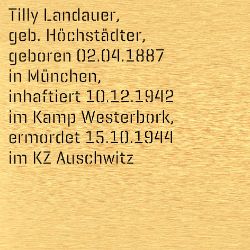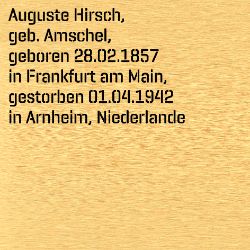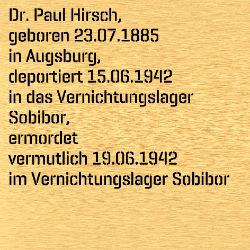Franz Landauer was born on July 26, 1882 in Munich. His brother Kurt Landauer later served for many years as president of the soccer club FC Bayern München. Their parents, Otto Landauer and Hulda, née Bernheim, owned a large fashion house on Kaufingerstraße. On September 23, 1908 Franz Landauer married Tilly Höchstädter; they moved into an apartment on the first floor of Königinstraße 85. After his father died in 1913, Franz Landauer and his brothers took over as managers of the fashion business. Franz Landauer fought as a soldier during the First World War and was promoted to the rank of officer. When the fashion house had to close at the end of the 1920s due to economic difficulties, Franz Landauer became an agent for Phönix Life Insurance. During the Nazi period, Franz and Tilly Landauer were subjected to increasingly restrictive persecution measures. In July 1938 the couple had to leave the apartment in Königinstraße 85 where they had lived almost 30 years and move in to Hohenstaufenstraße 7. In the course of the “Kristallnacht” pogroms, the National Socialists arrested Franz Landauer from November 12 to December 19, 1938 in Dachau concentration camp. The Nazi authorities also systematically robbed the couple: Franz and Tilly Landauer were forced to pay a 25,000 Reichsmark “Jewish property levy,” a so-called atonement tax imposed on all Jews after the November pogroms. In addition, they had to hand over all jewelry and items made of precious metals in March 1939. On August 24, 1939 Franz and Tilly Landauer fled to Amsterdam. In order to leave Germany, they had to pay "Reich flight tax" and "emigration tax” totaling 29,900 Reichsmark. After the Wehrmacht occupied the Netherlands, the SS deported the couple on December 10, 1942 to Westerbork transit camp. Franz Landauer died there on July 10, 1943, succumbing to the catastrophic conditions. His remains were buried in an urn at the Jewish cemetery in Diemen. The National Socialists also murdered Tilly Landauer, Franz Landauer’s brothers Leo and Paul Gabriel, and his sister, Gabriele Rosenthal. (text Barbara Hutzelmann, editor C. Fritsche, translation. T. Axelrod)







